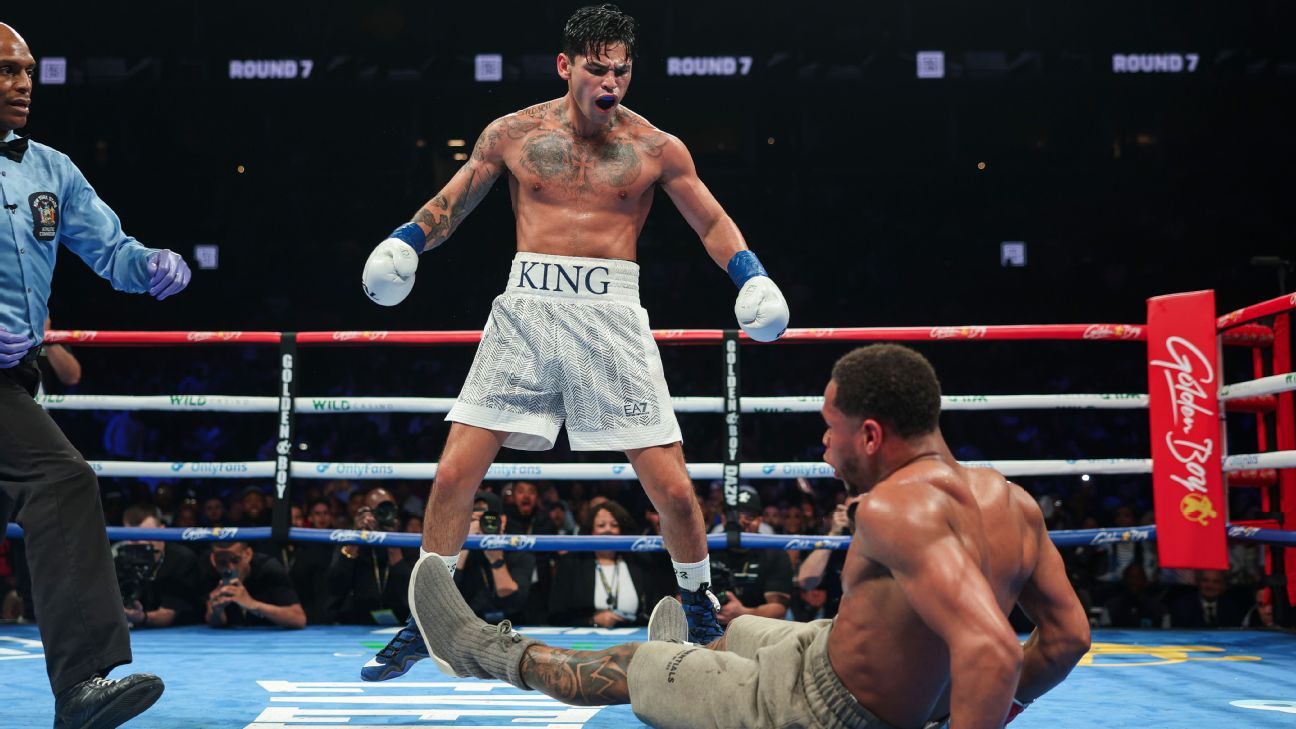Two supplements listed on doping control forms submitted by star boxer Ryan Garcia prior to his win over Devin Haney showed the presence of the banned substance Ostarine, according to Sports Medicine Research and Testing Laboratory (SMRTL) reports released Thursday.
The doping control forms – which were viewed by ESPN – were submitted alongside Garcia’s urine-sample collections on April 19 and 20 (the day before and the day of the fight), both of which returned adverse findings for Ostarine.
The supplements: raspberry-lemonade flavored NutraBio SuperCarb (which showed the presence of Ostarine at 70-2200 picograms per gram powder) and Body Health strawberry-flavored amino-acid blend (660 to 830 picograms). The other supplements Garcia listed on the forms: D3, Iron, Thorne elite multivitamins and magnesium glycinate.
Paul Greene, who represented UFC stars Jon Jones and Sean O’Malley in doping cases, told ESPN on Thursday he’s hopeful the presence of Ostarine in those supplements will lead to a reduced suspension for Garcia from the New York State Athletic Commission.
The commission’s doping rules adhere to strict liability, which means the fighter is responsible for any supplements they take. Greene acknowledges that there was still a “negligent component” to Garcia’s actions but argues it was an “innocent mindset.”
“The World Anti-Doping [Association] code actually recognizes a declaration of a supplement in advance as proof that the athlete took it, and it allows an athlete to get a reduced sanction in most cases,” said Greene, the founding partner of Global Sports Advocates, who is representing Garcia alongside three other attorneys.
“I’m hopeful that [the punishment] will be on the very lowest end of how they determine these cases,” he added. “Normally there’s a range of sanction based on degree of fault, and when you have a situation where you have a contaminated supplement where it’s not available in an internet search, it’s not on a label, there’s no way an athlete could have possibly known the banned substance was in there unless they would’ve sent it to one of the two WADA-accredited laboratories in advance.”
Greene hopes Garcia can avoid a hearing with the commission and all sides – the WBC, NYSAC and the fighter’s team – can come to an agreement on his punishment.
“We understand Ryan’s going to get some sanction,” Greene said, “but we feel like given this evidence now it should be a light sanction.”
He believes “four months or less” would be most appropriate.
Of course, not everyone agrees. Victor Conte, who works with Haney as a sports nutritionist and performance adviser, told ESPN the supplement “test results simply cannot be authenticated because there is no chain of custody.” Indeed, the lab reports indicated the supplements submitted were unsealed.
“Why are they testing powders from unsealed supplement containers?” said Conte, the founder of Bay Area Laboratory Co-Operative (BALCO). He served time in prison after pleading guilty to conspiracy to distribute performance-enhancing drugs before founding SNAC, a sports nutrition company.
“In my opinion, it seems likely that tampering may be involved. Testing of product samples from unsealed containers of the same manufacturing numbers is the place to start if the results are to be considered credible. How can test results from an unsealed container possibly be authenticated? This is not how credible science is conducted.”
Ostarine is a selective androgen receptor modulator (SARM) that attaches to proteins in the body and effectively signals for muscles to grow. It is used to aid performance by helping athletes build muscle mass and enhance their rate of fat loss, as well as to increase stamina and recovery ability.
Ostarine has been on the World Anti-Doping Agency’s banned list since 2008 and in 2022 was listed as an anabolic agent by WADA.
“I don’t know where [the adverse finding] came from,” Garcia, 25, told ESPN on earlier this month in Riyadh, Saudi Arabia, hours before he was ringside for Oleksandr Usyk’s heavyweight title win over Tyson Fury.
“Honestly, bro, I don’t. I was taking ashwagandha, D-3, Omega-3, just normal s—. I don’t know what the f— [ostarine] is. … I have seriously no idea. I would tell everybody the truth.
“My whole thing is I’d rather tell the truth than try to fabricate it with a lie. Because lies don’t stand. So if I really did take it, I would be like, honestly, I was going through a weird situation. I wasn’t really that confident. I chose to take it. I’m sorry. And that’s it. But I didn’t and I hate cheating. … All I can say is legal team, help me figure this out.”
Garcia floored Haney three times in the majority-decision win, but was ineligible to win the WBC junior welterweight title after he was 3.2 pounds overweight.
Ostarine has been used in boxing before. Lucian Bute tested positive for it in 2016 following a draw with Badou Jack in their WBC super middleweight title fight. The result was changed to a DQ win for Jack. Amir Khan was handed a two-year ban by UK Anti-Doping (UKAD) after he tested positive for ostarine following his sixth-round TKO loss to Kell Brook in 2022.
